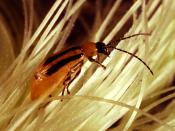Corn rootworms are tiny beetles that in there larval stage feed on root hairs, small roots and in adult stage feed on primary roots of corn. These insects are a major concern to the U.S. agricultural association as the "financial impact of corn rootworm [is] at $1 billion annually - $800 million in yield losses and $200 million in costs for insecticides" (colostate). In the recent years scientist at Monsanto have been able to come up with a solution: genetically modified corn with the rootworm resistant gene known as, YieldGard Rootworm corn. This issue was up in the air with the U.S. government and the scientific advisory panel for several years until recently in March 2003 the U.S. Environmental Protection Agency has authorized Monsanto for commercial use of this transgenic plant (Agent-feb). Of course, this created controversy and even more heat on the subject from several scientists and entomologists. The EPA is allowing 20% refuge for the insect, or the area that is planted to non-resistant corn.
A protein from Bacillus thuringiensis (Bt) is used in the YieldGuard Rootworm corn. The Bt microbe specifically targets corn rootworm larvae, "allowing the corn plant to naturally protect its roots against damage" (Agent-feb). U.S. Department of Agriculture (USDA) estimates that control of this "billion-dollar bug" will end up saving close to $1 billion annually. In the past several practices took place to defeat this bug. Early planting, where fields have complete pollen shed and grow strong roots before the bug can even large enough to lay eggs, so the plants have a larger root system which makes them tolerant to the bug. Insecticide treatment was a huge practice, if the records from previous year [showed] that beetle counts for a field averaged more than þ beetle per plant then insecticides were considered" (colosate2).


